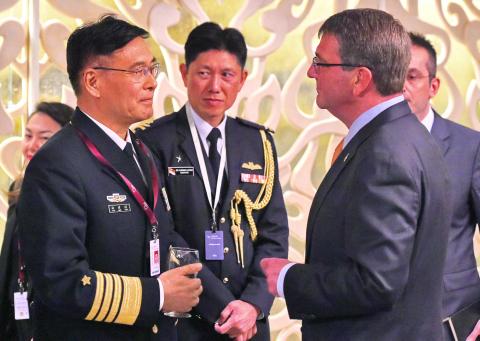China yesterday rejected US demands to stop land reclamation at disputed islets in the South China Sea, saying that it was exercising its sovereignty and using the controversial outposts to fulfill international responsibilities.
Chinese People’s Liberation Army Admiral Sun Jianguo (孫建國), deputy chief of the general staff department, told a security summit in Singapore that “the situation in the South China Sea is on the whole peaceful and stable, and there has never been an issue with the freedom of navigation.”
“China has carried out construction on some islands and reefs in the South China Sea mainly for the purpose of improving the functions of the relevant islands and reefs, and the working and living conditions of personnel stationed there,” he said.

Photo: AFP
“Apart from meeting the necessary defense needs, it is more geared to better perform China’s international responsibilities and obligations regarding maritime search and rescue, disaster prevention and relief ... and safety of navigation,” he added.
China insists that it has sovereignty over nearly all of the South China Sea, but rival claimants accuse it of expansionism.
“When dealing with maritime disputes with relevant neighboring countries, China has always kept in mind the larger interest of maritime security,” Sun told the annual Shangri-La Dialogue. “In spite of the sufficient historical and legal evidence and its indisputable claims, rights and interests, China has exercised enormous restraint.”
Sun was speaking a day after US Defense Secretary Ashton Carter demanded an end to all reclamation work.
“There should be an immediate and lasting halt to land reclamation by all claimants,” Carter said. “We also oppose any further militarization of disputed features.”
The Singapore summit, which ended yesterday afternoon, was earlier in the day marred by a brief security lockdown after police shot dead a local motorist who tried to flee a checkpoint near the event venue in a car later found to contain drugs.

SECURITY: As China is ‘reshaping’ Hong Kong’s population, Taiwan must raise the eligibility threshold for applications from Hong Kongers, Chiu Chui-cheng said When Hong Kong and Macau citizens apply for residency in Taiwan, it would be under a new category that includes a “national security observation period,” Mainland Affairs Council (MAC) Minister Chiu Chui-cheng (邱垂正) said yesterday. President William Lai (賴清德) on March 13 announced 17 strategies to counter China’s aggression toward Taiwan, including incorporating national security considerations into the review process for residency applications from Hong Kong and Macau citizens. The situation in Hong Kong is constantly changing, Chiu said to media yesterday on the sidelines of the Taipei Technology Run hosted by the Taipei Neihu Technology Park Development Association. With

CARROT AND STICK: While unrelenting in its military threats, China attracted nearly 40,000 Taiwanese to over 400 business events last year Nearly 40,000 Taiwanese last year joined industry events in China, such as conferences and trade fairs, supported by the Chinese government, a study showed yesterday, as Beijing ramps up a charm offensive toward Taipei alongside military pressure. China has long taken a carrot-and-stick approach to Taiwan, threatening it with the prospect of military action while reaching out to those it believes are amenable to Beijing’s point of view. Taiwanese security officials are wary of what they see as Beijing’s influence campaigns to sway public opinion after Taipei and Beijing gradually resumed travel links halted by the COVID-19 pandemic, but the scale of

A US Marine Corps regiment equipped with Naval Strike Missiles (NSM) is set to participate in the upcoming Balikatan 25 exercise in the Luzon Strait, marking the system’s first-ever deployment in the Philippines. US and Philippine officials have separately confirmed that the Navy Marine Expeditionary Ship Interdiction System (NMESIS) — the mobile launch platform for the Naval Strike Missile — would take part in the joint exercise. The missiles are being deployed to “a strategic first island chain chokepoint” in the waters between Taiwan proper and the Philippines, US-based Naval News reported. “The Luzon Strait and Bashi Channel represent a critical access

Pope Francis is be laid to rest on Saturday after lying in state for three days in St Peter’s Basilica, where the faithful are expected to flock to pay their respects to history’s first Latin American pontiff. The cardinals met yesterday in the Vatican’s synod hall to chart the next steps before a conclave begins to choose Francis’ successor, as condolences poured in from around the world. According to current norms, the conclave must begin between May 5 and 10. The cardinals set the funeral for Saturday at 10am in St Peter’s Square, to be celebrated by the dean of the College